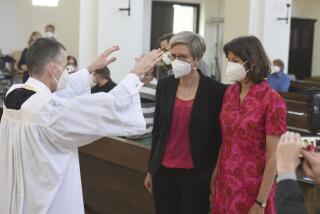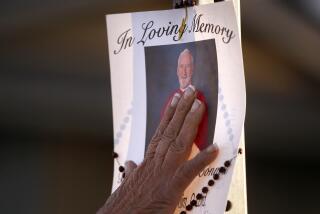Marriage Gives Priest Insight in Advising Catholic Couples : Clergy: He says he has different--though not necessarily better--viewpoint than celibate clerics.
ATLANTA — Father David Dye has an advantage over other Catholic priests who counsel engaged couples: He can fall back on his own experience as a husband for the past 22 years.
“As a married priest, I can give couples a different perspective than a celibate priest. Not necessarily a better perspective, but different,” Dye said.
Dye, 50, was an Episcopal priest until 1988, when he converted to Catholicism. He was ordained in the Roman Catholic Church in 1992 under an exemption allowing priests from Anglican churches to be ordained as Catholics and remain married.
He and his wife, Chantal, have three children, ages 13 through 20.
There are about 80 married Catholic priests in the United States, all of them former Episcopal priests.
Besides serving as chaplain at Georgia State University, Dye says Mass once a week at St. John Neumann Church in Lilburn, Ga., and counsels couples during a daylong seminar on marriage that the church requires engaged couples to attend.
The Atlanta Archdiocese did not select Dye for the job because he is married, but it didn’t hurt.
“Various priests have been involved in that position, and obviously none of them have been married,” said Father Peter Dora, an archdiocese spokesman. “But we are very happy that he can bring his perspective to the job.”
“I felt it brought a whole new dimension to marriage preparation,” said Lynn Crutchfield, who has worked with Dye in the pre-marriage program. “I thought he shared beautifully his relationship with his wife and children.
“Then again, it can be confusing to some,” she said. “It’s new for us, and it’s very surprising to some people.”
Dye says his marriage is sometimes a disadvantage in counseling.
“What if I have an argument with my wife and then I leave the house to counsel a couple?” he said. “Tell me what side I’m going to be on if they’re having a disagreement. I may be biased and side with the man while a celibate priest would be more objective.”
James Davidson, a sociologist at Purdue University who studies Catholicism, said many couples may be more apt to accept counseling from a married priest. “My sense is that there are a number of people who may have marital difficulties and be reluctant to go to a celibate priest because they would expect that he does not understand their problems,” he said.
But Richard Lamanna, a sociology professor at the University of Notre Dame, said: “You don’t have to be sick to treat an illness, and you don’t have to be married to be a marriage counselor.”


